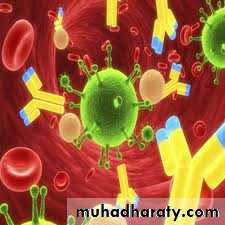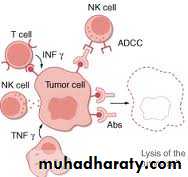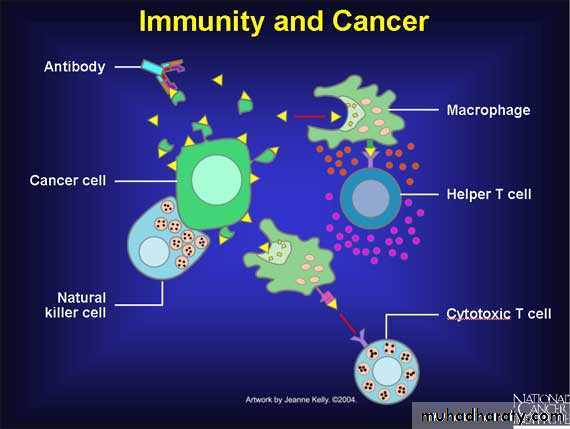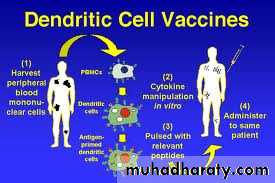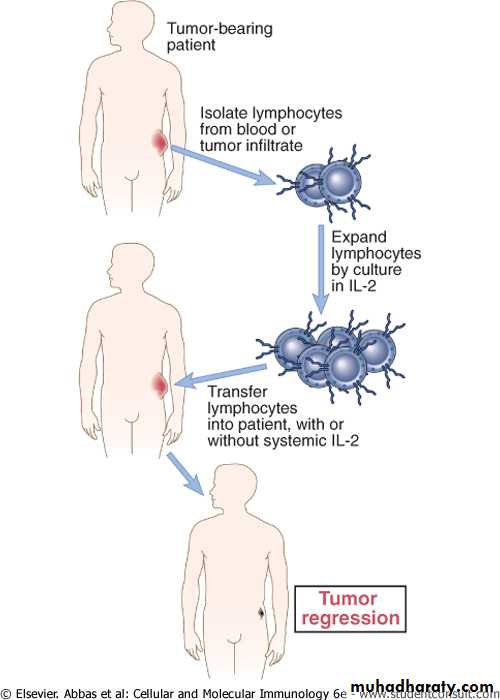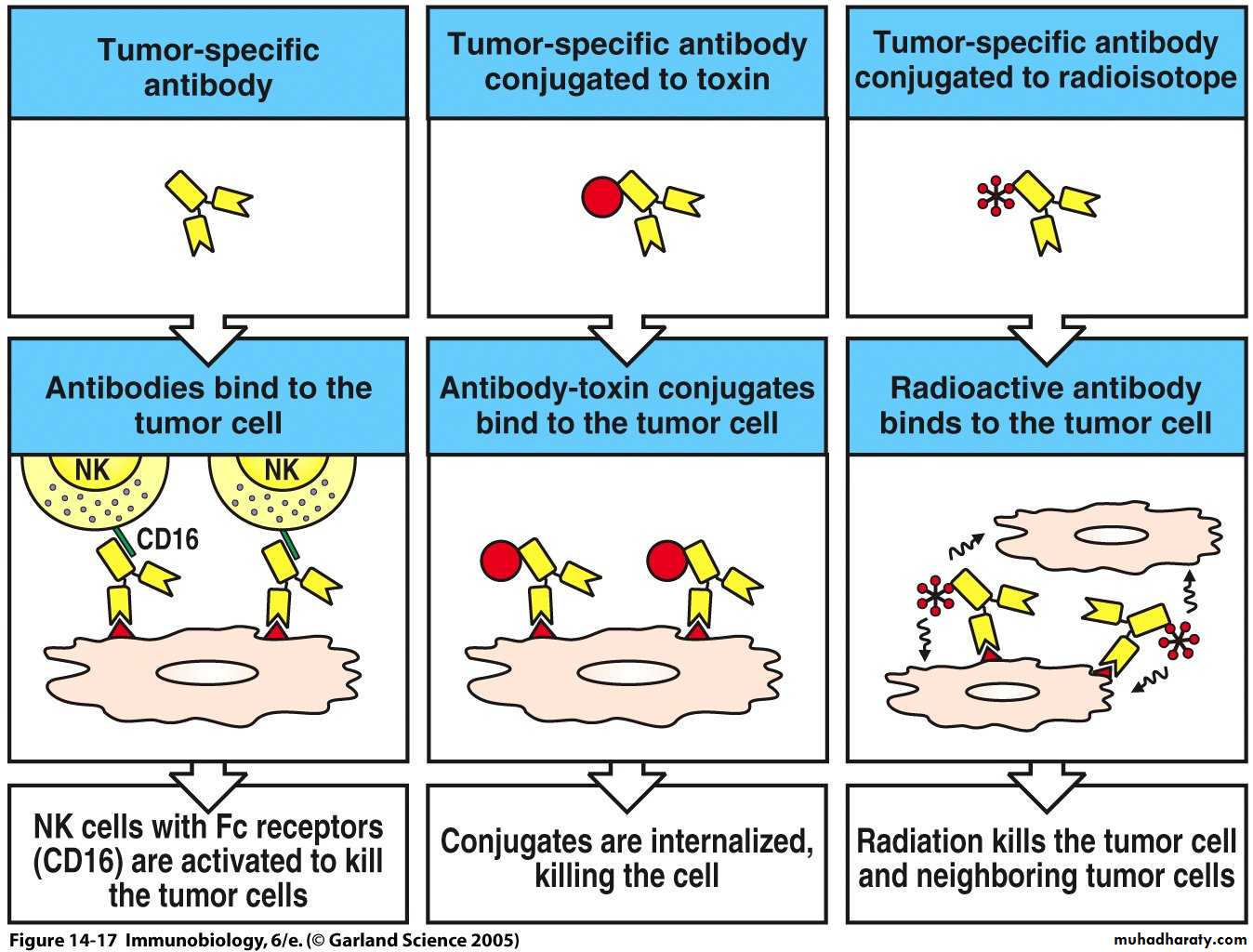Tumor immunologyDR.NADA a HASSO PHD MEDICAL MICROBIOLOGY
Tumor immunology
* Tumor is a pathological cell mass derived by abnormal and uncontrollable clonal expansion of single cell* Transformation of normal cells to malignant cells by:
a- Spontaneous mutation during daily cell division
chemical carcinogens
b- It may be induced by physical carcinogens
viruses
* Cells become antigenically different from normal cells
* They are recognized and destroyed by immune systemTypes of tumor Antigens
1.Tumor specific antigens
Unique to tumor cells & not expressed on normal cells.
May result from mutation due to exposure to chemical or physical carcinogen. When chemical or physical carcinogens induces two separate tumors at two different sites in the same animal, the tumor antigens are distinct, they rarely share common tumor specific antigens.
2.Tumor-associated antigens
Not unique to tumor cells, may be expressed on normal cells1. Antigens of oncogenic viruses
Virally-induced tumors express tumor Ags shared by all tumors induced by the same virus. e.g.: Human papilloma virus E6 protein in cancerous wart & E7 protein in cervical cancer. EBNA of EBV in B –cell lymphomas & nasopharyngeal cancer.
2. Oncofetal tumor Antigen
These Ags are found on tumor cells & also on normal fetal cells which are usually disappear later on with the development of the immune system. e.g. : CEA & AFP.
2.Tumor-associated antigens
3. Products of over-expressed cellular oncogenesA number of tumors have been shown to express tumor-associated antigens encoded by cellular oncogenes.
These Ags are also present in normal cells encoded by the corresponding proto-oncogenes. Therefore, they are non-immunogenic.
e.g: over-expressed HER2 in breast cancer.
Tumor associated antigens
4.Tumor specific differentiation antigensThey are specific for particular differentiation stage of various cell types.
Prostatic specific antigen (PSA)
Immune response to tumors
Innate immune response to tumors
NK cells
NK cells kill many types of tumor cells especially cells that have reduced class I MHC expression.
The loss of MHC class I molecules makes the tumor cells good targets for NK cells.
Some tumors express ligand for NKG2D activating receptor on NK cells thus stimulating antitumor response.
Immune response to tumors
NK cells can be targeted to IgG antibody coated tumor cells by FC receptors (ADCC).The tumoricidal activity of NK cells can be stimulated by cytokines such as interferon & Interleukin-2.
NK-T cells resemble NK cells in the ability to recognize & kill tumor cells
Immune response to tumor
Macrophages
Macrophages may be the 1st line of defense against tumor.Activated macrophages can kill tumor cells by several mechanisms.
Release of lysosomal enzymes, reactive oxygen species, and nitric oxide.
Binding of antitumor antibodies to FC receptor & subsequent phagocytosis.
Activated macrophages can release TNF-α which can kill tumors by inducing thrombosis in tumor blood vessels.
Adaptive immune response to tumorsT lymphocytes
Cytotoxic (CD+8 cells) are considered the important player in anti-tumor reaction.
CD+8 T cells may perform a surveillance function by recognizing and killing potentially malignant cells that express tumor Ags in association with MHC class-I.
CD+8 T cells responses specific for tumor Ags may require cross-presentation of tumor Ags by processing by APCs & displaying with MHC class-I.
CD+4 T cells are central to the development of anti-tumor immune response.
APCs express tumor Ags in association with MHC class-II will activate CD+4 T cells.
They secret cytokines that activate & regulate cytotoxic T cells
Humoral immunity
Abs may kill tumor cells by activating classical complement pathway.Or by antibody-dependent cell- mediated cytotoxicity (ADCC).
Evasion of immune system by tumors
• 1.T-reg cells may suppress T cell response to tumors, evidence from cancer patients indicated that the number of regulatory T cells are increased in such patients & these cells can be found in the cellular infiltrate in certain tumors.• 2.Tumors lose expression of antigens that elicit immune responses. This is called antigen loss variant and is common in rapidly growing tumors.
• 3. Class –I MHC molecule may be down-regulated on tumor cells so that they cannot be recognized by cytotoxic T cells.
Evasion of immune system by tumor
• 4.The products of tumor cells may suppress anti-tumor immune response such as TGF-β that inhibit proliferation & effector function of T-cells.
• 5.The cell surface antigen of tumors may be hidden from the immune system by sialic acid molecules which are produced in large quantities by tumor cells. This process is called antigen masking.
Immunotherapy for tumors
Aims of immunotherapy areEnhance immune response to the tumor (active immunity).
Administer tumor specific Abs or T cells (passive immunity).
Active Immunity
Vaccination with tumor cells & tumor AgsPurified tumor Ag with an adjuvant.
Immunization with dendritic cells purified from the patient & loaded with genes that encoding the specific tumor Ags. Or the dendritic cells are pulsed with specific tumor Ags.
Injection of plasmids containing the cDNA encoding the tumor Ag (DNA vaccine).
Active immunity
Active immunity
Virally –induced tumors can be prevented by vaccination with viral Ags . e.g : Hepatitis B virus & Human papilloma virus vaccines.Local administration of inflammatory substances such as BCG. The BCG mycobacterium activate macrophages & enhance macrophage killing of tumor cells.
Passive immunity
Cytokine therapy , it is possible to use systemic cytokines to enhance immune response such as IL-2 , It acts by stimulating the proliferation & anti-tumor activity of NK cells & CTLs.TNF, in presence of TNF-α &TNF-β, a tumor may undergo visible hemorrhagic necrosis & tumor regression.
Interferons, INF-γ is effective against tumors as it increases the cytotoxic activity of NK cells and CT cells & also increases class I MHC expression on various cell types.
Passive immunity
Adoptive T cell therapy, is the transfer of cultured T immune cells that have antitumor reactivity into a tumor bearing host. These cells are taken from the patient himself. The cells are cultured in high concentration of IL-2, then these lymphokine activated killers(LAK) are injected back to the patient.Passive immunity
Monoclonal Antibodies ,it is also called magic bullet, these tumor specific MCA can be conjugated to a lethal toxin (shigella or diphtheria toxin) or radioisotope to form immunotoxins capable of killing tumor cells. The attached MCA will target the toxin specifically to tumor cells.Tumor markers
Substances that are released by the tumor cells either due to the cause or effect of malignant process.Examples:
CEA :increases in colorectal cancerAFP : in hepatic cancer
PSA :in prostatic cancer
CA 19-9 : cancer of pancreas
CA 15-3 :cancer of breast
CA 125 : cancer of ovary
CA 72-4 :cancer of stomach
HGCH : cancer of placenta

